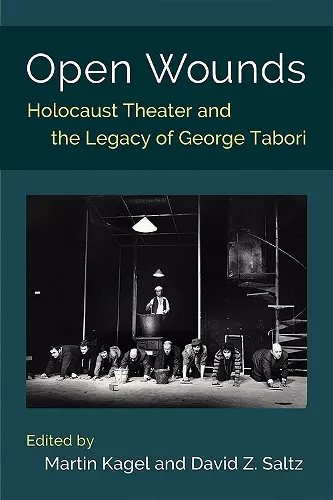Open Wounds
Holocaust Theater and the Legacy of George Tabori
David Z Saltz author Martin Kagel author
Format:Hardback
Publisher:The University of Michigan Press
Published:14th Feb '22
Should be back in stock very soon

This volume collects original essays on Hungarian-German playwright and screenwriter George Tabori (1914–2007) and his remarkable contributions to the stage. Tabori, a Jewish refugee and a truly transnational author, was best known for his work in New York theater that irreverently explored the Jewish experience, particularly the Holocaust. Although his illustrious career spanned a century, two continents, several languages, and a variety of literary genres, Tabori’s work has received scant attention in American letters, in spite of its significance for U.S. theater and Holocaust studies.
Until Tabori, most dramas about the Holocaust were either rooted in American domestic realism, striving to create a strong empathetic connection between the audience and Holocaust victims, or featured an unembellished documentary style. Tabori staked out a third position, beyond realism and documentation. The volume brings together the voices of international scholars to provide a comprehensive introduction to Tabori’s theater as well as in-depth analyses of his work, discussing all of his major plays. Individual essays address Tabori’s postdramatic theater in relation to sacrificial ritual, performance studies, and post-humanist approaches to the contemporary stage, as well as performance aspects of his productions, questions of ethics and aesthetics raised by his theater, and his plays’ relation to Holocaust representation in popular culture.
“By situating Tabori critically within the ever-expanding landscape of what is called, for better or worse, ‘the theater of the Holocaust,’ this book offers a richer accounting of the genre’s history as well as thoughtful reflection on its current efficacy and future potential. The book fills a gap both in our understanding of Holocaust representation broadly conceived and in contemporary theater studies. It will be welcomed by scholars and students alike.”
"In the history of Holocaust theater, the Hungarian-born playwright George Tabori (1914–2007) receives short shrift, at least compared to several of his better-known contemporaries. . . As Martin Kagel and David Z. Saltz's edited collection Open Wounds: Holocaust Theater and the Legacy of George Tabori shows, however, this is an unfortunate oversight, because Tabori's plays engaged with the history, memory, and mediatization of the Holocaust in ways that are by turns creative, provocative, illuminating, experimental, improvisational, disturbing, and funny."
—Monatshefte
"Open Wounds is a very good book, its strength stemming from its eclecticism and varying perspectives. It fulfills the promise of rendering the rich complexity of Tabori’s theatre work, and its ongoing legacy, more comprehensible to Anglophone readers. Theatre practitioners in the United States would do well to learn more about, and from, this brilliant, humane, and innovative figure, especially as a model for engaging creatively with our own injustices and traumas."
—Theatre Journal
"The essays are uniformly informative, well researched, and accessible. . . . Recommended."
—Choice
"Without exception, these explorations are illuminating, especially in regard to the contemporary performance scene and the shifting remembrance culture. But they also show how easily Tabori is misread. His legacy does remain a “fragile” one, as Peter Höyng concludes (157). This volume constitutes an important step in strengthening the reflection on exactly that fragility."
—Journal of Austrian Studies
"Despite his particular importance first for German-language theater, and then increasingly for European theater beginning in the 1970s, the theatrical work of George Tabori has long received little attention in US literary and theater studies. . . . The essays presented here are important approaches to these and other questions. Therein lies the importance and the merit of the volume."
". . . it is precisely its eclecticism that makes Open Wounds so valuable to anyone interested in how Tabori’s unique form of memory theater can thrive well into the twenty-first century and shows that a theatrical legacy may be found in unexpected places."
ISBN: 9780472132843
Dimensions: unknown
Weight: unknown
208 pages